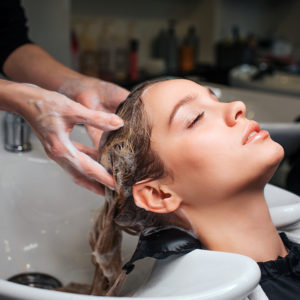Hair braider Dara Collier knows her craft. She started practicing twists and weaves as a child, until she mastered each look.
Customers near Atlanta appreciate her advanced skills, but Georgia regulators will not let her do something more basic: shampooing.
Washing clients’ hair outside a state-approved salon without cosmetology credentials is illegal in Georgia. As a self-employed braider, Collier does not need an occupational license to run her business in Georgia.
But that also means she cannot legally cleanse hair — something she would like to do as an extra precaution during COVID-19.
Regulators do not care that shampoo is safe, sold over-the-counter and routinely used at home by children. “It does not make a lot of sense,” Collier says.
Other states impose even stricter licensing rules, treating shampoo like a controlled substance.
A 2017 Institute for Justice analysis showed that 37 jurisdictions specifically mandated licensure for shampoo assistants or included the service in their definitions of cosmetology or related fields such as barbering. Oversight boards often require hundreds of hours of training to do something as simple as “apply, lather, rinse.”
The regulatory overkill does stop with shampooing. From coast to coast, beauty industry police conduct surveillance looking for unauthorized makeup artists, eyebrow threaders and hairstylists. Washington, D.C., and 22 states even create barriers for braiders. None of these beauty services pose public health or safety risks, yet licensing requirements abound.
Workers who cannot afford beauty school tuition, which typically tops $10,000, often hide in the shadows to avoid detection. Cristina Ziemer, an on-site makeup and hairstylist from Minnesota, recalls living like a criminal prior to legislative reform in her state.
Besides facing exploitation in the underground economy, she lost business opportunities because she had to keep her advertising quiet. “I was afraid that any public recognition for anything would be a way for the board to find me,” says Ziemer, a mother of two young children who depends on her income to make ends meet.
Thousands of beauty care providers can relate. Despite the risks, many choose to work in the open, hoping nobody shows up and demands to see their papers.
Arif Karowalia, who runs two chains called the Perfect Brow Bar and Perfect Salon & Spa, says a state inspector visited one of his locations about 18 months ago in Kansas and threatened his eyebrow threaders with prosecution.
The workers use only a clean cotton strand to sculpt facial hair. No chemicals, sharp objects, skin-to-skin contact or heat is involved, yet the inspector insisted that a full cosmetology license was required.
“We were scared,” Karowalia says. “We waited, but no criminal charges were filed. The inspector was just threatening us.”
People who provide safe, in-demand services should not have to live in fear or restrict the scope of their work. The ability to earn an honest living in the occupation of one’s choice is a fundamental human right. Regulators should not interfere unless they have a clear public interest. Even then, oversight should not be overly burdensome.
Unfortunately, state cosmetology boards often seem to care about special interests more than anything else. Many of these government boards are stacked with industry insiders, including beauty school owners who profit from regulations that force students to enroll.
Research shows that the economic protectionism hits vulnerable workers the hardest. This often means less economic opportunity for women, immigrants and communities of color. For example, states that require hair braiding licenses have fewer braiders relative to their Black populations than states that do not license braiders.
That disparity is clear in Mississippi and Louisiana.
When the Institute for Justice studied these two jurisdictions in 2012, Mississippi required no training and had over 1,200 registered braiders. At the same time, Louisiana required 500 hours of training to work as a braider and had only 32 licensed braiders — despite having a much larger Black population.
Removing unnecessary barriers to the beauty industry is a path that states can take to drive growth. The economy could use the extra boost during COVID-19, but untangling the red tape makes sense under any circumstance.
Twisted hair looks good, not regulations.

